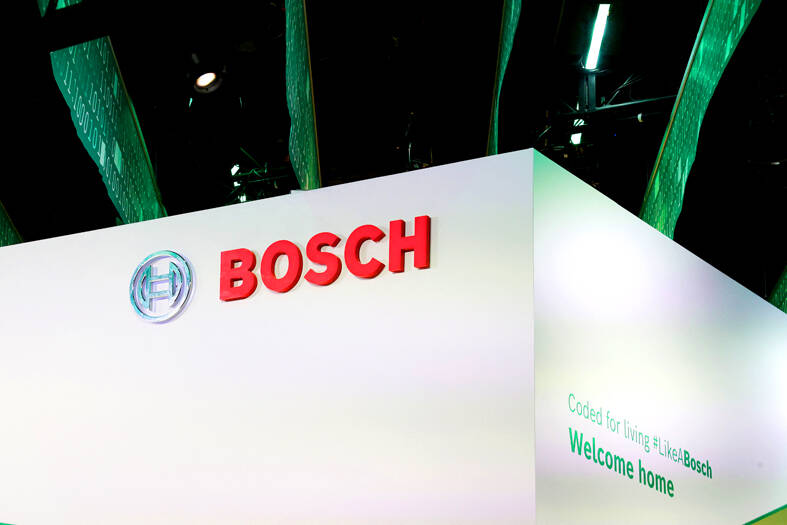German car parts supplier and home appliance maker Robert Bosch GmbH yesterday called for action to boost competitiveness in Europe’s struggling top economy as it reported falling profits and sales for last year.
Operating profit fell by a third, from 4.8 billion euros (US$5 billion) to 3.2 billion euros, with the firm blaming a weak global economy and slow growth in its electric vehicles (EVs) business.
Sales dipped 1 percent to 90.5 billion euros, the company said.

Photo: AFP
It was the latest sign of problems for Germany’s traditional manufacturers, particularly the flagship auto sector, which is facing a slowdown in EV sales, high manufacturing costs and fierce competition in key market China.
Bosch chief executive officer Stefan Hartung added his voice to calls for changes to improve the business climate in Germany, criticizing high energy prices and burdensome bureaucracy.
“Anything that makes doing business easier is a step in the right direction,” he said. “Then Germany and Europe can be among the world’s economic and technological frontrunners in the future.”
The number of Bosch staff fell last year by 11,500, to around 418,000, and the company said it could not rule out “painful decisions” in the future.
Bosch is the world’s biggest auto supplier, making products ranging from braking and steering systems to sensors. It also has other units making goods such as household appliances, heat pumps and air conditioners.
Continental AG, another car parts maker, on Thursday said that it would close five sites in Germany, putting 580 jobs at risk. That came on top of the 7,150 job cuts the company announced last year. The bad news comes after business groups organized demonstrations in cities across Germany earlier this week to send an “economic distress signal” to the government and demand urgent reforms.
Federal statistics agency Destatis on Thursday reported that GDP shrank 0.2 percent last year, in line with its earlier estimate and marking the second straight year of contraction for the German economy. The government this week slashed its growth outlook for this year to just 0.3 percent, down from a previous forecast of 1.1 percent.

In Italy’s storied gold-making hubs, jewelers are reworking their designs to trim gold content as they race to blunt the effect of record prices and appeal to shoppers watching their budgets. Gold prices hit a record high on Thursday, surging near US$5,600 an ounce, more than double a year ago as geopolitical concerns and jitters over trade pushed investors toward the safe-haven asset. The rally is putting undue pressure on small artisans as they face mounting demands from customers, including international brands, to produce cheaper items, from signature pieces to wedding rings, according to interviews with four independent jewelers in Italy’s main

Japanese Prime Minister Sanae Takaichi has talked up the benefits of a weaker yen in a campaign speech, adopting a tone at odds with her finance ministry, which has refused to rule out any options to counter excessive foreign exchange volatility. Takaichi later softened her stance, saying she did not have a preference for the yen’s direction. “People say the weak yen is bad right now, but for export industries, it’s a major opportunity,” Takaichi said on Saturday at a rally for Liberal Democratic Party candidate Daishiro Yamagiwa in Kanagawa Prefecture ahead of a snap election on Sunday. “Whether it’s selling food or

CONCERNS: Tech companies investing in AI businesses that purchase their products have raised questions among investors that they are artificially propping up demand Nvidia Corp chief executive officer Jensen Huang (黃仁勳) on Saturday said that the company would be participating in OpenAI’s latest funding round, describing it as potentially “the largest investment we’ve ever made.” “We will invest a great deal of money,” Huang told reporters while visiting Taipei. “I believe in OpenAI. The work that they do is incredible. They’re one of the most consequential companies of our time.” Huang did not say exactly how much Nvidia might contribute, but described the investment as “huge.” “Let Sam announce how much he’s going to raise — it’s for him to decide,” Huang said, referring to OpenAI

The global server market is expected to grow 12.8 percent annually this year, with artificial intelligence (AI) servers projected to account for 16.5 percent, driven by continued investment in AI infrastructure by major cloud service providers (CSPs), market researcher TrendForce Corp (集邦科技) said yesterday. Global AI server shipments this year are expected to increase 28 percent year-on-year to more than 2.7 million units, driven by sustained demand from CSPs and government sovereign cloud projects, TrendForce analyst Frank Kung (龔明德) told the Taipei Times. Demand for GPU-based AI servers, including Nvidia Corp’s GB and Vera Rubin rack systems, is expected to remain high,